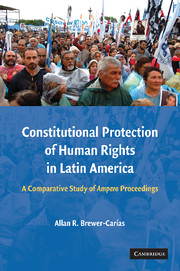 Constitutional Protection of Human Rights in Latin America
Constitutional Protection of Human Rights in Latin America Book contents
- Frontmatter
- Contents
- INTRODUCTION
- PART ONE THE CONSTITUTIONAL AND INTERNATIONAL DECLARATION OF HUMAN RIGHTS AND ITS JUDICIAL GUARANTIES
- PART TWO THE AMPARO AS A LATIN AMERICAN CONSTITUTIONAL AND INTERNATIONAL LAW INSTITUTION
- Chapter Three Judicial Review and Amparo Proceedings in Latin America
- Chapter Four The Amparo Action in Countries That Apply Only the Diffuse Method of Judicial Review of Legislation
- Chapter Five The Amparo Action in Countries that Apply Only the Concentrated Method of Judicial Review of Legislation
- Chapter Six The Amparo as a Constitutional Right in Countries with Mixed Systems of Judicial Review of Legislation
- Chapter Seven The Amparo as a Constitutional Guaranty in Countries with Mixed Systems of Judicial Review of Legislation
- Chapter Eight The American Convention on Human Rights and the Internationalization of the Amparo in Latin America
- PART THREE THE INJURED PARTY AND THE CONSTITUTIONAL RIGHTS PROTECTED BY MEANS OF THE AMPARO PROCEEDING
- PART FOUR THE INJURY, THE INJURING PARTY AND THE INJURING ACTS OR OMISSIONS IN THE AMPARO PROCEEDING
- PART FIVE THE EXTRAORDINARY CHARACTER OF THE AMPARO PROCEEDING
- CONCLUSION
- APPENDIX A List of Latin American Constitutions
- APPENDIX B List of Latin American Amparo Laws (Statutes)
- INDEX
Chapter Five - The Amparo Action in Countries that Apply Only the Concentrated Method of Judicial Review of Legislation
Published online by Cambridge University Press: 08 August 2009
- Frontmatter
- Contents
- INTRODUCTION
- PART ONE THE CONSTITUTIONAL AND INTERNATIONAL DECLARATION OF HUMAN RIGHTS AND ITS JUDICIAL GUARANTIES
- PART TWO THE AMPARO AS A LATIN AMERICAN CONSTITUTIONAL AND INTERNATIONAL LAW INSTITUTION
- Chapter Three Judicial Review and Amparo Proceedings in Latin America
- Chapter Four The Amparo Action in Countries That Apply Only the Diffuse Method of Judicial Review of Legislation
- Chapter Five The Amparo Action in Countries that Apply Only the Concentrated Method of Judicial Review of Legislation
- Chapter Six The Amparo as a Constitutional Right in Countries with Mixed Systems of Judicial Review of Legislation
- Chapter Seven The Amparo as a Constitutional Guaranty in Countries with Mixed Systems of Judicial Review of Legislation
- Chapter Eight The American Convention on Human Rights and the Internationalization of the Amparo in Latin America
- PART THREE THE INJURED PARTY AND THE CONSTITUTIONAL RIGHTS PROTECTED BY MEANS OF THE AMPARO PROCEEDING
- PART FOUR THE INJURY, THE INJURING PARTY AND THE INJURING ACTS OR OMISSIONS IN THE AMPARO PROCEEDING
- PART FIVE THE EXTRAORDINARY CHARACTER OF THE AMPARO PROCEEDING
- CONCLUSION
- APPENDIX A List of Latin American Constitutions
- APPENDIX B List of Latin American Amparo Laws (Statutes)
- INDEX
Summary
Other Latin American countries, on the contrary, do not apply the diffuse method of judicial review, having adopted the concentrated one as the only method of judicial review, as is the case of Bolivia, Chile, Costa Rica, El Salvador, Honduras, Panama, Paraguay and Uruguay. In all these countries the concentrated method of judicial review is applied as the only one existing in the country by reserving for the Supreme Court or to a Constitutional Tribunal the monopoly to control the constitutionality of legislation. It is because of this concentrated system of judicial review that in countries like Costa Rica, El Salvador and Nicaragua the power to decide the amparo action has also been concentrated in a “Constitutional Jurisdiction” as it also happens with the amparo actions in Europe.
However, in Latin America, this is an exceptional trend and regarding the amparo action, in general terms the Supreme Courts or the Constitutional Tribunals are not the only ones empowered to decide them. On the contrary, in the majority of the Latin American countries with concentrated system of judicial review, the amparo jurisdiction corresponds to a variety of courts and judges.
Thus, for the purpose of studying the amparo in countries with only a concentrated system of judicial review, a distinction must be made between countries where amparo is attributed to a single court with a concentrated power of judicial review and countries where it is attributed to the whole judiciary.
- Type
- Chapter
- Information
- Constitutional Protection of Human Rights in Latin AmericaA Comparative Study of Amparo Proceedings, pp. 102 - 119Publisher: Cambridge University PressPrint publication year: 2008


